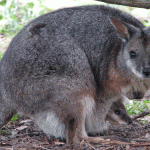
A family of viruses that kill bacteria could soon be used to help clear acne-prone skin. Image: Deklofenak/Shutterstock
Viruses that live on the skin naturally quash acne-causing bacteria.
Although acne is not life threatening it does affect millions of people and can leave severe emotional and physical scars. There is no guaranteed treatment that works for everybody and even the most effective interventions have a high risk of side effects that can include depression, weight gain and sore dry skin.
Researchers from the University of California, Los Angeles (UCLA) and the University of Pittsburgh, US, have discovered that a family of viruses living on human skin called P. acnes bacteriophages could be an effective acne treatment as they naturally seek out and kill blemish-causing bacteria (Propionibacterium acnes). Little research had previously been conducted on these viruses, even though it has been known for some time that they have a relationship with acne-causing bacteria and are relatively easy to isolate from human skin.
“Phages are programmed to target and kill specific bacteria, so P. acnes phages will attack only P. acnes bacteria but not others like E. coli,” said Laura Marinelli, lead author of the study published in the American Society for Microbiology’s mBio journal. “This trait suggests that they offer strong potential for targeted therapeutic use.”
The researchers used over-the-counter pore cleansing strips to collect the bacteria and P. acnes phages from the noses of two groups of volunteers: those with acne and those with clear skin. The phage genomes were then sequenced and it was found that on top of their powerful ability to destroy P. acnes bacteria these viruses are also small and have limited genetic diversity making them fitting candidates for building targeted antimicrobial drugs. The researchers explain that the lack of genetic differences from phage to phage makes it difficult for bacteria to form resistance.
A question that arises from the research is why acne occurs at all when this natural defence system is always present on the skin surface? One hypothesis is that in some people the populations of these viruses are insufficient to keep acne-causing bacteria numbers down. When a pore in the skin gets clogged (which often happens) it forms an anaerobic environment: one with little to no oxygen. This is the perfect habitat for P. acnes bacteria and it will rapidly multiply and thrive. If there are not enough viruses to stop the bacterial bloom, oil and skin cells behind the blockage build up and the immune system is recruited, resulting in the formation of white heads.
The team plan on studying the active protein in the P. acnes virus in more depth and further test the safety and effectiveness of phage therapy. They say there are a number of reasons why it is so important to quickly develop alternative acne treatments. “Antibiotics such as tetracycline are so widely used that many acne strains have developed resistance, and drugs like Accutane, while effective, can produce risky side effects, limiting their use,” said co-author Jenny Kim, director of the UCLA Clinic for Acne, Rosacea and Aesthetics, in a statement. “Acne can dramatically disfigure people and undermine their self-esteem, especially in teens. We can change patient’s lives with treatment. It’s time we identified a new way to safely treat the common disorder.”

Electron micrographs of 11 different P. acnes bacteriophages. The study showed how all are very close genetically and are similar in appearance. Image: Marinelli et al., 2012
Source: University of California, Los Angeles (UCLA)






